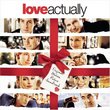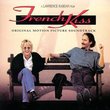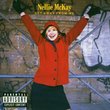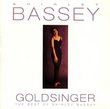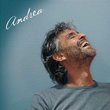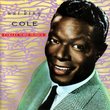| All Artists: Samuel Barber, Leonard Slatkin, Saint Louis Symphony Orchestra, Israela Margalit Title: Barber: Adagio for Strings; Violin Concerto; Orchestral & Chamber Works Members Wishing: 1 Total Copies: 0 Label: EMI Classics Release Date: 5/24/2005 Genre: Classical Styles: Ballets & Dances, Ballets, Chamber Music, Forms & Genres, Concertos, Suites, Historical Periods, Modern, 20th, & 21st Century, Instruments, Reeds & Winds, Strings, Symphonies Number of Discs: 2 SwapaCD Credits: 2 UPC: 724358656121 |
Search - Samuel Barber, Leonard Slatkin, Saint Louis Symphony Orchestra :: Barber: Adagio for Strings; Violin Concerto; Orchestral & Chamber Works
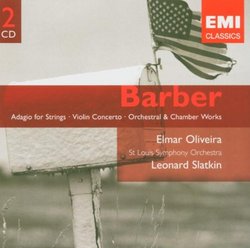 | Samuel Barber, Leonard Slatkin, Saint Louis Symphony Orchestra Barber: Adagio for Strings; Violin Concerto; Orchestral & Chamber Works Genre: Classical
|
Larger Image |
CD DetailsSimilarly Requested CDs
|
CD ReviewsMost valuable Barber set. Jon. Yungkans | Whittier, CA USA | 09/14/2005 (4 out of 5 stars) "Having virtually all the shorter orchestral works plus some of the best chamber and instrumental music makes this set more than its weight in gold -- especially now that EMI has sensibly lowered the price even further by issuing it on its Gemini line. This set also fills a void as an adjunct to RCA France's two-disc release of the First Symphony and three concertos with Slatkin and the St. Louis Orchestra. (Or, if you don't want the symphony -- and which Barber lover wouldn't? -- RCA now has those concertos on one very full mid-price disc.) The only major work missing is Knoxville, which no one coming to Barber's music should be without. But, depending on what you want with that heavenly masterpiece, there are ways to easily solve that problem. Of course, the fiercest competition to these recordings comes from Naxos through Marin Alsop and the Royal Scottish Symphony Orchestra. Both Alsop and Slatkin have Barber's music fully in their blood. They practically breathe and move by the pulse and cadence of the music, and they intuitively understand the yin and yang of its dramatic and the rhapsodic qualities. Slatkin lingers more than Alsop in the quieter spots, and takes bigger risks, yet maintains greater control and tension in overall pacing. In The School for Scandal Overture, a wider ranging ride through the valleys and expertly picking up the pace through the dramatic peaks shows Slatkin at his best. He adopts takes an even broader pace than Alsop out of the gate in the Third Essay. Once past any thought of ponderousness, one hears how Slatkin links the notes like Alsop, phrasing the lines and even that percussion solo at the onset, taking more time than her in projecting the emotive weight and complexity, which is so easy to miss in this work. The results, as in Alsop's reading, are enormous, but richer and more rewarding. The other way this set sweeps the field is through the impressive stable of chamber and instrumental works - nearly a full disc's worth. Each performance is very good to exceptional, and together yields a much wider (and welcome) range and variety in Barber's music than we are normally accorded. All of the players deserve special mention: cellist Alan Stepansky and pianist Isreala Margalit in the Cello Sonata; flautist Jeanne Baxtresser and Margalit in the Canzone for flute and piano; Margalit as soloist in Excursions, Nocturne in homage to John Field and two pieces arranged from the piano four-hands Souvenirs; and Baxtresser, Joseph Robinson, clarinetist Stanley Drucker, bassoonist Judith Le Clair and French hornist Philip Myers in Summer Music. The Violin Concerto is the only also-ran, and not because it is a bad performance - just a less than fully persuasive one. Soloist Elmar Oliveira combines Isaac Stern's firm tone with some of the Kyoko Takezawa's rhapsodic approaches to the melodies. The key word here is "some." As good as Oliviera is - and he is very good - where he lacks is striding one leg on Stern's stay-on-the-rail firmness to the work's structure and the other on Takezawa wider-ranging, more mercurial jaunt around the course. He's astride two horses with very different temperaments and riding styles, not giving either mount his full attention but doing all he can just to keep them together. Slatkin gives this piece his all, but Oliviera holds him back. When you hear Slatkin and Takezawa, you hear how Slatkin and his team are willing to deliver a much more exciting a ride. " His best mandy | TN | 08/14/2007 (5 out of 5 stars) "Wonderful collection of Barber's best. Of course it includes Adagio, his most well know, but many other greats as well, like Essay for Orchestra."
|

 Track Listings (8) - Disc #1
Track Listings (8) - Disc #1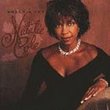
![Gene Pitney - Greatest Hits [Curb]](https://nationalbookswap.com/cd//m/56/8756/228756.jpg)
